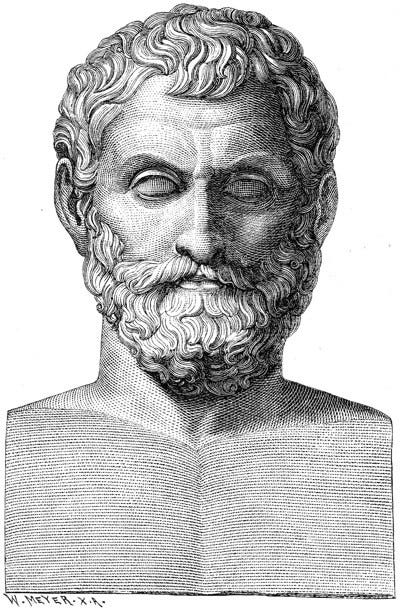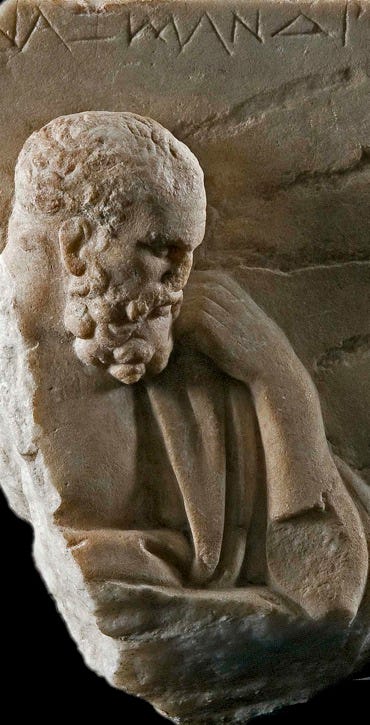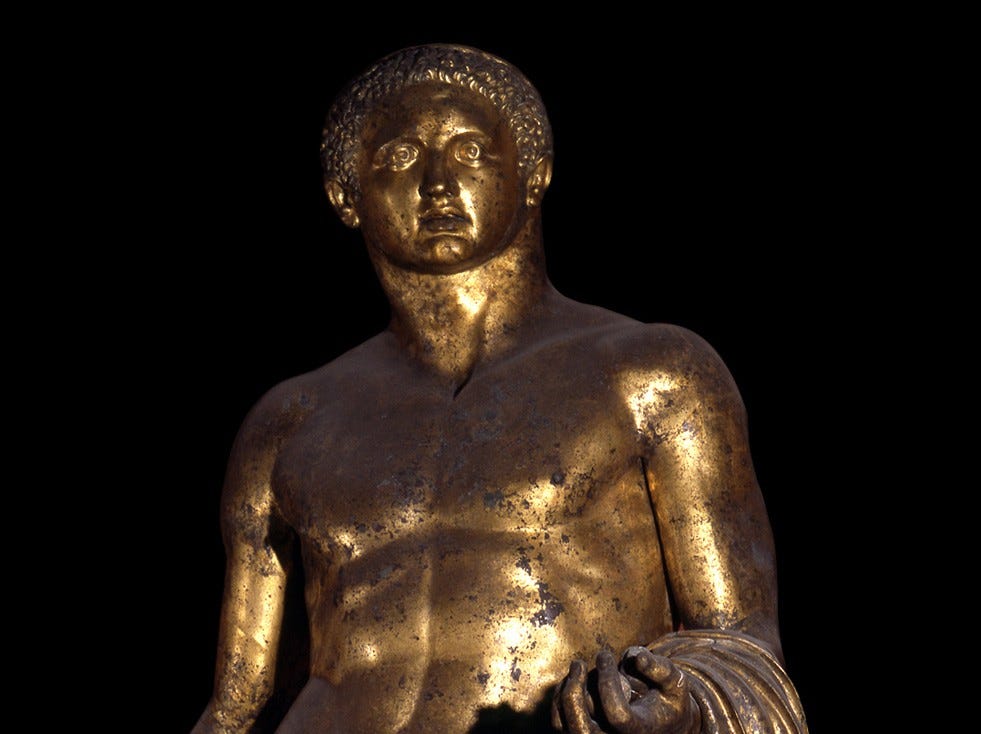Dear Classical Wisdom Reader,
How do things begin?
I suppose it’s a bit of a philosophical question…
Which is fitting, as today’s article is about the very origins of Greek philosophy itself. We’re looking at the Milesian philosophers, who began a style of inquiry which would mark something of a starting point for both philosophy and science.
In particular, we’re looking at their attempts to understand the universe itself, and the mysterious concept of the Apeiron, an unknowable substance behind all things…
Also, in case you missed it earlier in the week, check out our recent podcast with none other than Stephen Fry! The renowned broadcaster, and author of books like Mythos and Troy, spoke to Anya about the importance of Greek myths, AI, and how some of us are Zeus and some are Prometheus.
You can find that HERE. It’s all very philosophical!
I wonder what the Milesians would have made of it…
All the best,
Sean Kelly
Managing Editor
Classical Wisdom
The First Philosophers and the Boundless Universe
by Van Bryan
In some circles, Anaximander is considered to be the first philosopher. Generally, the more popular opinion is that the first philosopher was Thales of Miletus. As Bertrand Russell states in his History of Western Philosophy…
“Philosophy begins with Thales.”
However Anaximander, Thales’ pupil, might deserve the title more simply because of his attempts to construct the type of philosophical argument that we have come to know and love. Thales declared that the underlying principle of the universe was water, and that all things come from water in one way or another. He provided no real argument to support this seemingly baffling claim; or if he did, we simply would not know, seeing as how the man left no extant work.
On the other hand, Anaximander did attempt to construct a series of arguments to support his hypothesis that the universe was born from an unknowable, unobservable substance known as Apeiron, which loosely translates to “the boundless” or “that which has no limit.”
Now, the question of who was truly the first philosopher of Greece, Thales or Anaximander, may never truly be answered. They both belonged to a group of early pre-Socratic thinkers who lived in Miletus, a coastal town on the shores of what is now modern day Turkey, in about 550 BC. These “Milesian philosophers” primarily concerned themselves with one question and one question only:
Why and how does the universe exist?
Heavy stuff, right?
It’s important to remember that these early thinkers were not blessed with the millennia of scientific knowledge we possess today. While we now stand on the shoulders of giants, these pre-Socratic philosophers were giant-less. They were striking out for the first time into the fields of natural science and cosmology, and they were doing it on their own. While their conclusions might appear to be baffling to us, we must remember that it is only because of these early scientific endeavors that we are blessed with the olympiads of knowledge that we take for granted today. If we do indeed stand on the shoulders of giants, then the Milesians were the first rung of the ladder that we climbed to reach our lofty perch.
That being said, what is it that they were specifically searching for?
The Milesian philosophers were interested in the underlying substance that constituted all of existence. They believed that there existed a common denominator from which all things come to be. This primary substance was known as Arche and it translates roughly to “the source.”
This type of metaphysical philosophy is something that modern readers might not be very familiar with. We can happily recount the periodic table of the elements or observe the structure of an atom under an electron microscope. Metaphysics, however, is often uncomfortable for us. It does not bother with the specific happenings of the universe. Metaphysics aims at understanding being qua being, the underlying principles of all things. Put very simply, if physics is the study of existence, metaphysics hopes to answer the question, “what is existence?”
Ultimately, Anaximander wanted to know where the universe came from. He wanted to explain the origin of reality as we know it. The philosopher did so with the Apeiron.
Before we go any further, we must first recognize that the ancient Greeks held the belief that the world was constructed form the four primary elements: earth, water, wind, and fire.
When considering the underlying foundation of the universe, Anaximander came to the conclusion that this world has the capacity for infinite plurality; meaning that the things within our universe are unique. Every rock, tree, and drop of water is different from any other rock, tree, or drop of water that ever was or ever will be.
In short, nature is unlimited in its ability to produce variation and change.
Building upon this, we can see that if there exists the potentiality for infinite variation, there must logically exist the potentiality for an infinite amount of matter. Epicurus would come to a similar conclusion when he wrote…
“The sum of things is infinite. For what is finite has an extremity, and the extremity of anything is discerned only by comparison with something else.” -Epicurus (Letter to Herodotus)
So we see that our universe, at least through this argument, has no limit upon it and is actually infinite. Therefore, Anaximander concluded that none of the four primary elements could possibly function as the Arche of the universe. For how could it be said that any one substance, which is concrete and discernible, is responsible for the unlimited variety that exists within reality.
And so Anaximander appeals to what is known as the Apeiron, an unobserved substance (substance being a rather generous description for it) that has no limits placed upon it. It is this prime substance, this endless primordial essence, that all things are born from and, in time, all things will disappear into.
“Anaximandros of Miletos, son of Praxiades, says that the first principle of things is the infinite; for from this all things come, and all things perish and return to this. Accordingly, an infinite number of worlds have been generated and have perished again and returned to their source…” -Aetius of Antioch
So we see that Anaximander believed that the boundless, the infinite Apeiron, was the source of all existence. It was the active cause through virtue of which reality as we know it can be.
However, we are still left wondering what exactly “the boundless” is. What, precisely, is the Apeiron? Anaximander gives us no definite answer to this question, a frustration which is expressed by the 1st century philosopher Aetius of Antioch…
“…but he fails to say what the infinite is, whether it is air or water or earth or some other thing. He fails to show what matter is, and simply calls it the active cause.” -Aetius of Antioch
Well, it seems like we might have an answer. However, we are no closer to understanding precisely what this answer means. We cannot grasp upon the notion of an Apeiron.
However, one possible solution exists – a conclusion that would be supported by the renowned philosopher, Aristotle.
You see, dear reader, there is one hypothesis that states that the word Apeiron does not translate to “the boundless” but rather to “the indefinite.”
Anaximander believed that the world was composed of two pairs of opposites: the hot and the cold, and the wet and the dry. These unique qualities would correspond to the four primary substances: fire, earth, water, and wind.
It is possible that Anaximander believed that these four elements were once combined within the Apeiron and that they took on shape and form after leaving the Apeiron, creating the world as we know it in the process.
Therefore, we must understand that the Apeiron is an unknowable quantity. It is neither hot nor cold, nor is it wet or dry. However, it has the potential to be all of these things at once, and at the same instance it is none. In other words, the Apeiron is that which is indefinite.
This is a rather difficult idea for people to wrap their heads around. How can it be that there exists some boundless substance that at once has the qualities of all things while simultaneously having no qualities at all?
Aristotle would come to a similar conclusion in his Metaphysics when considering the idea of matter and form. When attempting to understand the essence of an object, Aristotle would conclude that the substance is the hylomorphic compound of matter and form.
That is to say that a bronze statue of Heracles (insofar as it is a bronze statue of Heracles) is only so because it is composed of matter (bronze) and form (Heracles). These two predicates combine to create the essence of the statue.
However, if we were to separate matter and form (in thought) then we would struggle to comprehend the result. In truth, we simply cannot comprehend matter without form.
When considering the example of the statue, we might say that if we were to separate the matter (bronze) from the form (Heracles) then we might be simply left with a pile of bronze. However, we must recognize that we have not removed form from this compound. The matter has simply taken on a new form (a pile of bronze).
So we begin to picture a type of matter that has no shape, substance, or dimensions. This type of substance is usually referred to as “prime matter,” and it is unique in that it is, all at once, nothing at all while simultaneously having the potentiality to be all things.
Whether we have come to accept Anaximander’s Apeiron as the prime substance of the universe, or simply decide to shake it off as interesting food for thought, there is no denying the allure and mystery of such an idea. It is the idea that from the infinite void there came, for a time, a discernible universe. It is the idea that our universe will some day return from whence it came – back into the abyss, into the infinite, into the boundless reaches of the Apeiron.









In reading this it occurred to me that apeiron is similar in concept to the Tao
We stand on the shoulders of giants and pygmies. Trouble is, we have one leg on a giant’s shoulder and the other on a pygmies. Needless to say it is a very precarious position.